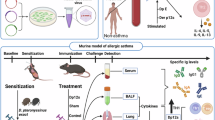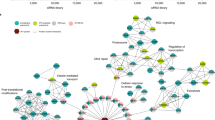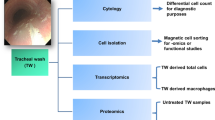Abstract
The accumulation and infiltration of eosinophils in airways is one of the most important characteristics of asthma, and is mediated partly by secretion of IL-5 from Th2 lymphocytes. It is well known that interleukin-5 (IL-5) played an important role in the regulation of eosinophils. In this study, an anti-sense IL-5 gene transferred by recombinant adeno-associated virus (rAAV-ASIL-5) was prepared to transfect allergic rats. It was found that the expression of IL-5 protein in plasma and BALF were inhibited significantly. The rAAV-ASIL-5-mediated suppression of total cell counts in peripheral blood and BALF were also observed. Moreover, rAAV-ASIL-5 remarkably reduced the eosinophil counts in peripheral blood and BALF, as well as the expression of ECP protein in plasma and BALF. The inflammation in lungs of rAAV-ASIL-5 pretreated rats also became slighter when compared with allergic rats. Otherwise, no apparent pathological damage to vital organs of rats was found. In conclusion, recombinant adeno-associated virus-mediated delivery of anti-sense IL-5 gene inhibited the accumulation of eosinophils and the airways inflammation in rat model of allergic asthma via suppressing IL-5 expression. It suggested the feasibility of rAAV-ASIL-5 in the gene therapy for allergic asthma and other eosinophilic diseases.
Similar content being viewed by others
Article PDF
Author information
Authors and Affiliations
Corresponding author
Rights and permissions
About this article
Cite this article
Zeng, D., Cao, Y., Song, Q. et al. The effects of anti-sense interleukin-5 gene transferred by recombinant adeno-associated virus in allergic rats. Nat Prec (2008). https://doi.org/10.1038/npre.2008.2036.1
Received:
Accepted:
Published:
DOI: https://doi.org/10.1038/npre.2008.2036.1



